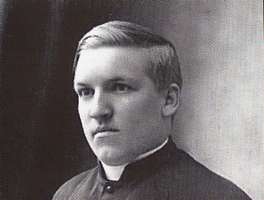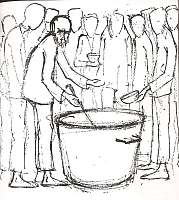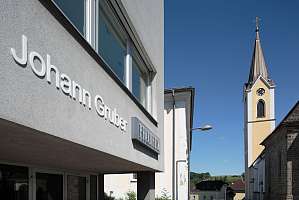Johann Gruber
“The Saint of Gusen”
Dr. Johann Gruber was a teacher and a Roman Catholic priest who did not hesitate to offend the Nazis after the 3rd Reich´s annexation of Austria.

In 1938, Dr. Gruber was removed from his job and imprisoned by the Nazis who accused him of sexually abusing some of his pupils. As a result, Dr. Gruber was sent to prison at Linz and Garsten from 1938 to 1939, to wait for the Nazi trials against him. After these trials, he was first sent to KZ Dachau and then, because he was a priest, to KZ Gusen in 1940. So, from the first hour, he was a prominent Austrian political prisoner at this camp.
When the Vatican achieved improvements for priests in the concentration camps in March 1940, most of the German and Austrian priests at KZ Gusen camp were re-transferred to the better KZ Dachau camp. But Dr. Gruber volunteered to remain in KZ Gusen to help his Polish comrades who were to be exterminated in KZ Gusen.
Since Dr. Gruber had been in very good standing earlier in his life with many high-ranking people of the former Austrian Republic, he was granted unusual privileges by the SS, and he used these privileges to help the poorest of his comrades in the camp. Thus, he became a very valuable inmate at KZ Gusen to both the SS and the inmates. This put him in a position to organize many things. For example, he organized a school inside the camp to educate Polish children who were deported to the camp.

In addition, in 1941, when archeological findings were made along with the construction of a railway to KZ Gusen, Dr. Gruber became chief of that archeological command. This position also allowed him to maintain contacts with people outside the camp (archeologists, people from museums, etc.). He was able to raise money from his friends on the outside and to smuggle this money into the camp while arranging for the archeological findings to be registered in museums outside the camp. This enabled him to bribe SS-men and Kapos to allow him to organize food inside the camp for those inmates who were starving, and thus saving many lives.
But smuggling money in was not all; together with friends from Linz, he also smuggled out information about KZ Gusen. Unfortunately, his organization was betrayed in early 1944 and he was tortured and ritually killed by the SS and GeStaPo in April 1944.
With “Papa” Grubers death, hope vanished for many inmates and KZ Gusen became a “Hell of Hells” without any chance for survival.
Since 1987 several attempts are made to achieve the canonization of “Papa” Gruber at the Vatican.

Finally, the Nazi sentence against Dr. Johann Gruber (6 Hv 247/38, 6 Vr 839/38) was officially reversed on January 29, 1999 by “Landesgericht Linz” – 55 years after his martyrdom.
The place in front of the KZ Gusen Memorial was named in the honour of Dr. Johann Gruber “Papa-Gruber-Platz” along with the local-international commemoration at Gusen on May 5, 2001.
On December 20, 2001 the governor of Upper Austria, Landeshauptmann Dr. Josef Puehringer, and Maximilian Aichern, the Bishop of Linz, inaugurated a memorial plaque in the presence of M. Paul Brusson (President of Amicale Belge de Mauthausen) and M. Fjodor Solodovnik (Vice-President of the International Mauthausen Committee) at the “Institut fuer Hoer- und Sehbildung” in Linz, Austria.
The Roman Catholic parish of St. Georgen/Gusen dedicated the art project "Denk.Statt Johann Gruber - Passage gegen das Vergessen" on the square in front of the parish churches by Berlin artist Renate Herter to him in 2013 . Also the parish home in St. Georgen was renamed to "Dr. Johann Gruber Pfarrheim" along with this project in remembrance to him and the more than 40.000 concentration camps victims on the territory of the parish of St. Georgen/Gusen.
Austrian writer Thomas Baum dedicated the play "Der Fall Gruber" to him in 2017.
A plenty of documents concerning Johann Gruber and the former KL Gusen concentration camps can also be found online in "Sammlung Freudenthaler" [The Freudenthaler Collection]
See also: Plattform Johann Gruber
Recommended literature:
- Bandion Wolfgang, Johann Gruber: Mauthausen-Gusen 7.April 1944 mit 14 Radierungen von Alfred Hrdlicka, WUV-Universitätsverlag, Wien 1995
- Bernadac Christian, Les Sorciers du Ciel – L´Organisation Gruber (about Dr. Johann Gruber), France Empire, Paris 1969
- Brusson Paul, Allocution de l´President de l´amicale Belge de Mauthausen pour Gusen, Bulletin Interieure de l´ Amicale Francaise de Mauthausen, Numero Special pour la 50eme Anniversaire de la Liberation, Paris 1995
- Carrouges Michel, Père Jacques (The Previous Good Friday), The Macmillan Company, p.208 ff, New York 1961
- Deble Louis, Johann Gruber, pretre autrichien, assasine le 7 avril 1944, Bulletin Interieure de l´ Amicale Francaise de Mauthausen, Numero Special pour l´ 50eme Anniversaire de la Liberation, Paris 1995
- Freudenthaler Christoph, Schlager-Weidinger Thomas, Dr. Johann Gruber - Annäherung und Anstoß, Wagner Verlag, Linz 2020
- KURIER (Austrian Newspaper), “Mord zu Christi Todesstunde” (Murder at Christ´s Hour of Death), p. 15, Vienna, April 2, 1999
- Lenz Johannes Maria, Christus in Dachau – Priester in Gusen, Libri Catholici, Wien
- Plattform Johann Gruber, Denk.Statt Johann Gruber - Neue Wege der Erinnerungskultur, Wagner Verlag, Linz 2014
- Wagner Helmut, Dr. Johann Gruber - Priester-Lehrer-Patriot - Nonkonformität und ihre Folgen in der Zeit des Nationalsozialismus, Wagner Verlag, Linz 2011
- Wagner Helmut, Dr. Johann Gruber, Blutzeugen des Glaubens, Martyrologium des 20. Jahrhunderts, Band 2, Diözesen: Graz-Seckau, Linz, Wiener Dom-Verlag, Wien 2000 (Herausgeber: Jan Mikrut)
- WIENER KIRCHENZEITUNG (Austrian Newspaper), “Staerker als die SS” (More powerful than the SS), p. 6, Vienna, May 2, 1999
Recommended TV footage:
- Deutschmann Ruth, Dr. Johann Gruber, TV-Beitrag fuer ORF-FS2 ORIENTIERUNG am 14. Mai 2000, ca. 8 Min, Wien 2000
#RememberGusen